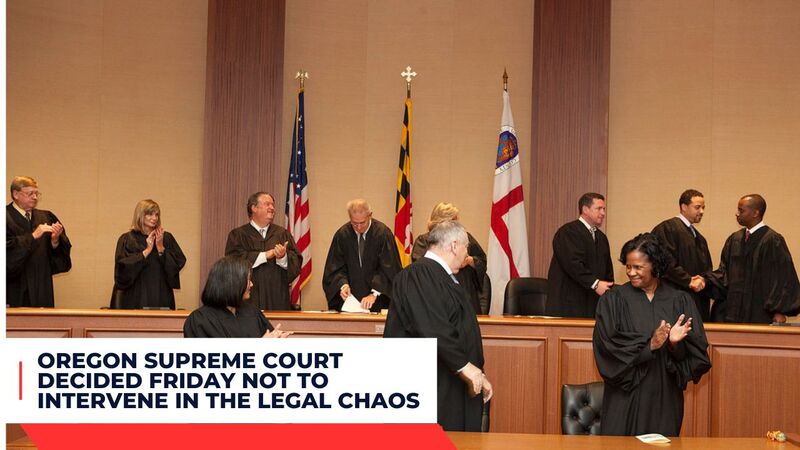Election officials and judges across the nation are grappling with questions that could threaten American democracy. Some, like Oregon Secretary of State Lavonne Griffin-Valade, have rejected efforts to remove Trump from primary ballots; other states such as Michigan and Minnesota allow him to remain. Illinois and Massachusetts authorities have filed challenges.
The Case
Oregon Supreme Court Justice Meagan Flynn issued a brief order explaining that they will wait for a ruling from the U.S. Supreme Court regarding how the 14th Amendment applies to candidates before taking any further steps on this lawsuit filed by voters in Colorado seeking to bar former President Trump from their primary ballot. She noted an upcoming decision from that body could provide relief for some of their issues.
Voters represented by Oregon Attorneys Jason Kafoury from Kafoury & McDougal and Daniel Meek from Meek & Flynn have filed suit against Oregon Secretary of State LaVonne Griffin-Valade over her refusal to remove Donald Trump from the ballot. Their challengers assert that her failure violates Section Three of the 14th Amendment which bars those engaging in acts of insurrection from holding public office.
Griffin-Valade asserts that it isn’t her responsibility to determine which candidates should run in a presidential primary election. According to her, primary elections do not serve as direct elections and voters don’t directly select nominees but instead direct delegates towards national conventions which ultimately determine this question.
Why It’s Important
Free Speech for People filed the lawsuit to challenge Donald Trump’s eligibility in Oregon, Michigan, Minnesota, Illinois and Massachusetts. It is one of several challenges being levelled against his eligibility in these states.
Oregon Secretary of State LaVonne Griffin-Valade has asserted that this lawsuit lacks merit as voters do not cast votes during primary elections to select nominees, but rather instruct delegates at national conventions as to how to vote; per Oregon GOP rules all delegates are required to support the winner of their state primary.
She further asserts that, as only overseer of a primary, she lacks the authority to judge whether a presidential candidate meets all Constitutional criteria.
Supreme Court Justices chose Friday not to intervene in a legal dispute between parties involved, waiting until U.S. Supreme Court rules on a Colorado case that could have similar ramifications. That decision will come on February 8 when arguments will be heard and they should rule quickly after hearings conclude.

The Oregon Supreme Court’s Decision
Five Oregon voters led by Free Speech for People filed a ballot challenge in November against Oregon’s ballot, asking its high court to direct Secretary of State LaVonne Griffin-Valade to disqualify Donald Trump from primary and general elections ballots due to his involvement with the Jan. 6 insurrection, alleging it violates 14th Amendment provisions which prohibit officials who engage in insurrection from holding office.
Griffin-Valade denied their request on the basis that Oregon law doesn’t permit her to make such decisions. Furthermore, she noted that Oregon primary is just part of the long process – ultimately national convention delegates will choose the nominee after Oregon votes have taken place.
The Supreme Court recently agreed to hear a Colorado case, likely providing clarity for challenges filed in other states such as Michigan and Minnesota where top courts had already declined to remove Trump from their ballots, Illinois and Massachusetts where challenges remain outstanding and Oregon where ballots will soon be finalized for primary voting. Arguments in Colorado will take place on Feb 8 – one week before Oregon ballots are approved and finalized!
The Future
Oregon Supreme Court decided Friday not to intervene in the legal chaos over whether Donald Trump can run for president, leaving this decision up to U.S. Supreme Court which is reviewing similar case from Colorado. Consequently, Trump can remain on ballot at least temporarily until that decision has been made by U.S. Supreme Court.
Oregon voters filed the lawsuit under the 14th Amendment of the Constitution which bars candidates who engage in “insurrection” after taking an oath to support it from being eligible to run for office, thus disqualifying Trump from running on their ballot. They are represented by two Portland attorneys and national advocacy group Free Speech for People.
Secretary of State LaVonne Griffin-Valade asserted that Oregon’s primary only determines who will appear on the general ballot; voters do not pick their candidates for nomination – they direct delegates to attend a convention that determines this process.
To know more about recent developments, visit our Alts news website. Thankyou!
- Friday Intraday Trading Sees Nvidia’s stock Market Cap Momentarily Cross $2 Trillion
- Trump’s January 6 Civil Cases Proceed While Criminal Case Is Halted
- Trump Delivers Speech at the Columbia Black Conservative Federation Gala
- Trump Declares Strong Support for IVF Following Alabama Supreme Court Decision
- Schumer in Ukraine Declares US Backing During House Aid Standoff






